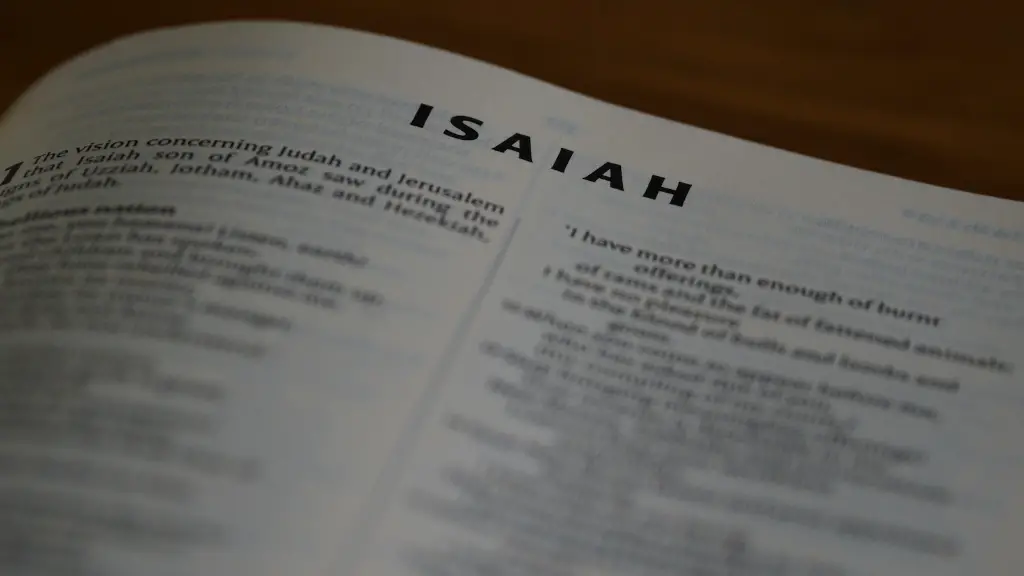Isaiah was a Hebrew prophet in the 8th century BCE. He was the son of Amoz, from the kingdom of Judah. Isaiah is best known as one of the greatest Hebrew prophets of all time. He is believed to have been active primarily during the rule of King Hezekiah, and was a major figure in the kingdom’s spiritual and political life.
Isaiah is mentioned more than any other prophet in the Hebrew Bible. His words, written down by the scribes, formed the core of Isaiah’s prophecy: a promise of hope and comfort in troubled times. His warnings of divine retribution and judgment, particularly against the kings of Israel, set him apart from other prophets. Isaiah foretells the coming of the Messiah and speaks of a messianic age.
In his time, the Hebrew people were in a state of chaos and adversity. Faced with a ruthless Assyrian conquest and the threat of deportation, Isaiah spoke boldly against idolatry and called the people to repentance and solidarity in the face of the archetypal world powers of their day. He encouraged faith in the one true God who “alone is worthy of worship,” and warned all nations of the impending disaster if they did not fear and respect Him.
He also offered vivid imagery of God’s judgment and comfort in a future of holiness and justice. Along with Jeremiah, Ezekiel, and other prophetic writers, Isaiah was one of the many inspired prophets during a turbulent era of history. His words still echo among the faithful today, providing instruction, comfort, and direction in an ever-changing world.
Isaiah is credited with powerful literary compositions, and his prophecies are still widely studied by Jews, Christians, and students of religion. His works are filled with vivid imagery and poetic language, providing insight into the message that he was inspired to deliver. In addition, his prophecies provide warnings of judgment but also convey divine promise and hope of salvation and redemption.
Isaiah’s writings have had a profound impact on Judaism, Christianity, and Islam alike, giving us a glimpse into a timeless truth – the love and mercy of God. His prophesies offer comfort in times of trouble, hope in times of despair, and faith in times of uncertainty. His words continue to serve as a beacon of light in a dark and troubled world.
Discourse of Isaiah
Isaiah’s discourse is filled with powerful imagery, allegories and metaphors, which serve as understated warnings to the nations and call for humble repentance. He wrote of a future in which the nations would come together and the Messiah will be born in the line of King David. He wrote of a powerful kingdom that was to come, and of its holy king, who will lead all of them back to faith in one God.
Isaiah also speaks of retribution against the wicked, and of a grim future if the people did not turn away from their wicked and sinful ways. This is a message of strong rebuke and dire warning, but Isaiah’s words also express hope, love, and mercy. He speaks of a time when all will be forgiven and the past will be forgotten.
Isaiah paints a compelling picture of a future time of peace and prosperity, and of God’s justice and mercy. His vision of the messianic age is filled with hope and promise. It is this ultimate hope that Isaiah conveys to his readers, despite the turbulence and uncertainty of his day.
Major Prophecies of Isaiah
Isaiah’s prophecies, especially those concerning the Messianic Age, have been among the most influential and controversial in history. The most famous is Isaiahchapter 7, which speaks of the coming of a child to be born from a virgin, placed first among the prophecies in the New Testament. Isaiah 11:1-9 is another highly significant prophecy, describing the Messianic King who will restore the kingdom under God’s will. In addition to these, Isaiah wrote extensively of a coming of judgment and divine retribution on the nations, making it clear that such consequences would result from sin and idolatry.
Isaiah’s prophesies have been particularly important to Christians, as many of his words have been interpreted as references to Jesus and His teachings. Jesus himself quoted Isaiah, and his apostles often referred to his prophecies as well. It is believed that these prophecies were fulfilled in the coming of Jesus, His life, and His death.
Isaiah’s prophecies provide insight into the nature of God and His relationship with humanity. They remind us of His mercy and patience, and His willingness to forgive, even in the face of sin and wickedness. In this way, Isaiah’s words continue to provide comfort and insight to people of all faiths.
Symbolic Significance of Isaiah
Isaiah’s work is not only informative but also symbolic. Isaiah was a messenger sent by God to remind the people of Judah of God’s grace, compassion and love. His call to repentance, justice and hope resonates with us now as it did with his original audience. Throughout his writings, Isaiah often speaks through the use of symbolic language and imagery. ‘Cup of Wrath’ and ‘Branch of Righteousness’, for example, are used to signify God’s anger at sin and His unrelenting pursuit of justice.
The message of Isaiah is not indicative of a distant and unapproachable God but instead a loving and compassionate one. Through symbolic language, he instructs us to turn to the Lord, warning of the consequences of disobedience. Isaiah’s symbols, arguments and messages are still relevant to this day, and his work serves as a powerful reminder of the true nature of God, a God of grace, mercy and justice.
Impact of Isaiah in the Modern World
Isaiah has been deeply influential in both religious and secular thought since his time, not only in terms of his messages of hope and justice, but also in terms of his literary mastery. One need only look to William Blake’s “The Book of Isaiah” and Handel’s “Messiah” to find evidence of Isaiah’s lasting inspiration and impact.
His writings continue to challenge and inspire readers from around the world who find solace and guidance in his words. Isaiah calls us to repentance, to justice, to peace, and to a deeper understanding of God’s love and mercy. His words are as relevant today as they were in his own time, and his work stands as a timeless example of divine prophecy.
The Presence of Isaiah in Jewish Tradition
Isaiah’s prophecies also remain an important part of certain Jewish festivities, such as the feast of Sukkot, for which Isaiah’s words are used in the ritual thanking of God. He is also referred to in the Haggadah, the retelling of the Passover story, in which the prophet’s imagery of spring and winter, listening to God’s voice, and consolation through exile, are used to describe the redemption of the Jewish people.
Isaiah’s words have been central to the Jewish religion since its inception, and remain so to this day. He is among the foremost of the Hebrew prophets, and his messages remain powerful and relevant even in today’s world.
Relevance of Isaiah to Christianity
Isaiah’s prophecies of the coming of the Messiah hold even greater significance for Christians. It is in Isaiah that Jesus often cites his Messianic mission. Isaiah’s prophecies provided much of the basis for the New Testament. Christian spiritual writers throughout history have been particularly fascinated by Isaiah, with some of the greatest theologians of the Middle Ages composing major works dedicated to Isaiah and his prophetic message.
From Saint John of the Cross to Saint Thomas Aquinas and Saint Augustine, the writers of Christian tradition have found rich spiritual nourishment in Isaiah’s works, particularly in his writings on humility and repentance, and his declaration that the Lord himself is our teacher. The relevance of Isaiah to Christianity lies both in his prophecies, his rich spiritual guidance and his testament to the grace and love of God.
Influence of Isaiah on Modern Culture
The writing of Isaiah has had a marked influence on western culture, not only in terms of religious thought, but also in the arts, literature and other forms of cultural expression. From the work of Handel and Blake, to the writings of Milton and T.S. Eliot, Isaiah has left a lasting impact, providing inspiration to those seeking to make sense of the complexity of life.
Even today, Isaiah’s words remain relevant, providing a comforting message of hope and redemption in spite of suffering and chaos. His words serve to remind us of the power of faith and the potential of hope, even in the darkest times. Isaiah’s words continue to inspire those seeking to make sense of the world around them, and remain an important and enduring source of comfort and guidance.





